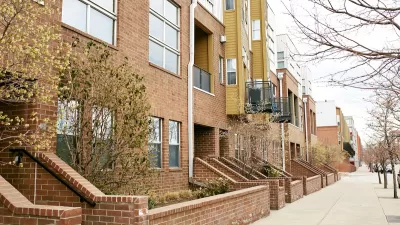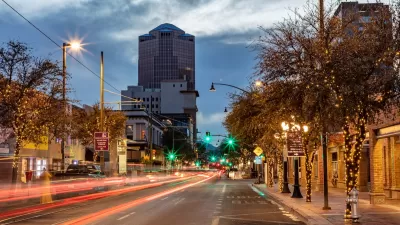Herb Caudill explains why the need to plan for a range of transportation modes and uses of space in urban environs is common sense - not part of a concerted assault on cars.
"The central fact about cars, from a planner's perspective, is that they
take up space. Lots of space. And this matters because space in cities
(a.k.a real estate) is scarce and therefore expensive." So says Caudill, who argues why the need for cities to rethink their relationship to the automobile derives from this simple fact, and not from a philosophical or moral argument against cars.
According to Caudill, our efforts over the past century to accommodate the growing space requirements of the automobile - with more freeways, more roads, and more parking - has failed for two primary reasons. "First," he says, "you can never build enough...Second, when you do make more space for cars you quickly start to
crowd out any other potential mode of transportation, especially
walking. All those parking lots and freeways and roads spread everything
else out so that the distances become too great for walking."
Because owning and driving an automobile isn't an option for everyone (in D.C., 1/3 of residents live in a car-less household), planning for the car effectively discriminates against a significant part of the population.
"So we have to take steps to increase the market share of
non-driving modes of transportation," concludes Caudill. "That's not a pro-car policy or an
anti-car policy, it's just a sensible response to the way the world is."
FULL STORY: Cutting dependence on cars isn't anti-car, it's common sense

Alabama: Trump Terminates Settlements for Black Communities Harmed By Raw Sewage
Trump deemed the landmark civil rights agreement “illegal DEI and environmental justice policy.”

Study: Maui’s Plan to Convert Vacation Rentals to Long-Term Housing Could Cause Nearly $1 Billion Economic Loss
The plan would reduce visitor accommodation by 25% resulting in 1,900 jobs lost.

Planetizen Federal Action Tracker
A weekly monitor of how Trump’s orders and actions are impacting planners and planning in America.

Wind Energy on the Rise Despite Federal Policy Reversal
The Trump administration is revoking federal support for renewable energy, but demand for new projects continues unabated.

Passengers Flock to Caltrain After Electrification
The new electric trains are running faster and more reliably, leading to strong ridership growth on the Bay Area rail system.

Texas Churches Rally Behind ‘Yes in God’s Back Yard’ Legislation
Religious leaders want the state to reduce zoning regulations to streamline leasing church-owned land to housing developers.
Urban Design for Planners 1: Software Tools
This six-course series explores essential urban design concepts using open source software and equips planners with the tools they need to participate fully in the urban design process.
Planning for Universal Design
Learn the tools for implementing Universal Design in planning regulations.
Caltrans
Smith Gee Studio
Institute for Housing and Urban Development Studies (IHS)
City of Grandview
Harvard GSD Executive Education
Toledo-Lucas County Plan Commissions
Salt Lake City
NYU Wagner Graduate School of Public Service





























